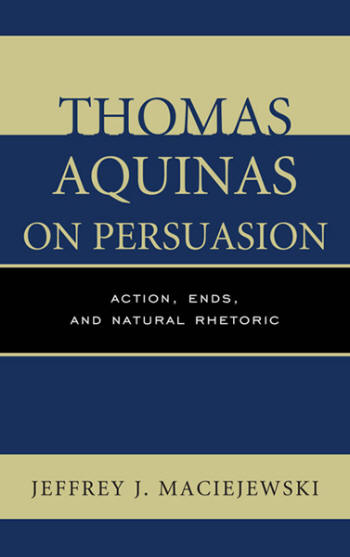Book Review
Thomas Aquinas On Persuasion
Action, Ends, And Natural Rhetoric
Jeffrey J. Maciejewski
Lexington Books (27 March 2017)
ISBN:
978-1498556958
 This
proved to be a fascinating read in an area that, to the best of my
knowledge, has received little attention. Rhetoric is the very human need
to persuade. The author examines the rich contribution that Aquinas has
made in this area.
This
proved to be a fascinating read in an area that, to the best of my
knowledge, has received little attention. Rhetoric is the very human need
to persuade. The author examines the rich contribution that Aquinas has
made in this area.
My own particular interest was primarily focused on the sections on human nature and the way in which we reason. What Aquinas has to say with regard to these things has been explained clearly by the author. Central to Aquinas's theory of human nature is the idea that the human soul is comprised of the intellect, the will and the emotions. The purpose of the intellect is to know. The purpose of the will is to follow what is dictated to it by the intellect. The good, as perceived by the intellect, moves the will and the will, in turn, moves the intellect.
The aim of the speculative intellect is knowing and the aim of the practical intellect is acting. The author notes that "intention" for Aquinas refers to the way in which the will responds to what the intellect perceives as good. Deliberation follows intention. Aquinas refers to this stage as counsel. A decision on how we act must then be made and Aquinas refers to this as judgment or choice. Like intention, this involves a dynamic interaction between will and intellect. The intellect assembles a range of choices and orders them to the good. The will then decides among them. Execution or command is the final stage of human action. Like intention and choice, command involves the will responding to the command dictated by the intellect. The constant dynamic of will and intellect is very well explained.
How do the emotions influence reason? By two means, says Aquinas. Firstly, by distracting the intellect from its intended operation. Second, by influencing its judgment. The emotions can hinder reason and the operation of the will and they affect the intellect in an indirect way.
From all this, the author advances his central thesis and does so persuasively, so to speak: discourse that enables discursive reasoning is persuasive or rhetorical in character. The rhetorical influence of the passions on the intellect and will is due to its ability to affect the kinds of images we have in our heads about what we intend doing.
The author concludes that the process engaged by the intellect is rhetorical because the intellect must deliberate and affirm understanding in judgment, activities that require some manner of persuasion. The will's movement of the intellect to engage in counsel is also rhetorical.
This work proved to be a very helpful study of what Aquinas has to say on human nature in general and rhetoric in particular.
Reviewed by Dr Pravin Thevathasan
